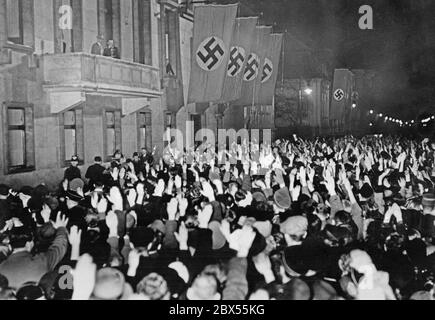
Finally, on September 1, 1939, Germany invaded Poland, igniting World War II, as both France and the United Kingdom declared war against Germany to defend Poland's sovereignty. Then, in 1938, it annexed Austria (the 'Anschluss') and through the Munich Agreement, the Sudetenland as well, a German-speaking region in Czechoslovakia before conquering the rest in 1939, pushing Europe ever closer to war. First, in 1935, the state reintroduced mass conscription, and in 1936 it moved to occupy the Rhineland region (a demilitarized zone) both actions constituted direct violations of the Treaty. Driven by a desire to avenge the punishments of the First World War and its hated Treaty of Versailles, Nazi Germany made increasingly aggressive military actions (much to the dismay of many of the German military high command). These acts boosted the regime's popularity. In the mist of the Great Depression, the Nazis restored economic stability and ended mass unemployment with massive military spending and extensive public work projects, such as the continued construction of the Autobahn (high speed highways).

In this new government, Hitler wielded absolute power and German bureaucracy became a collection of factions "working towards the Führer": Hitler issued vague instructions on many policies and expected his subordinates to work the details out on their own. In 1934, after the death of President Hindenburg (who was all but a figurehead at this point) Hitler merged the offices of Reichspräsident with his own into a new one: Führer und Reichskanzler, more commonly referred to as Der Führer (The Leader). This act spelled the end of the Weimar Republic by granting Chancellor Hitler emergency powers, abolishing all other political parties, and stripping away almost all powers of the Reichstag. The NSDAP quickly moved to silence all opposition to its power by passing the Enabling Act of 1933. Having more seats than any other party in the Reichstag (the legislative body of the Republic) Adolf Hitler was appointed Chancellor ( Reichskanzler) in January 30, 1933. The Nazi Party grew steadily until it became the largest political entity in the Weimar Republic in 1933. The Great Depression allowed the party's popularity to grow even faster as impoverished Germans flocked to Hitler's banner. These policies proved popular among those embittered by the Treaty. Hitler based the Nazi platform on reversing the Treaty of Versailles, restrengthening the nation, and on a stab-in-the-back ( Dolchstoßlegende) notion that the German military did not "lose" the war but was rather betrayed at a critical moment by traitorous civilians (Communists, Jews), thereby causing the war effort to fail. National Socialist German Workers' Party (German: Nationalsozialistische Deutsche Arbeiterpartei, abbreviated NSDAP), or later on Nazi Party.

In September 19, 1919, Adolf Hitler, a World War 1 veteran, joined a small political party at a beer hall in Munich, Germany.


 0 kommentar(er)
0 kommentar(er)
